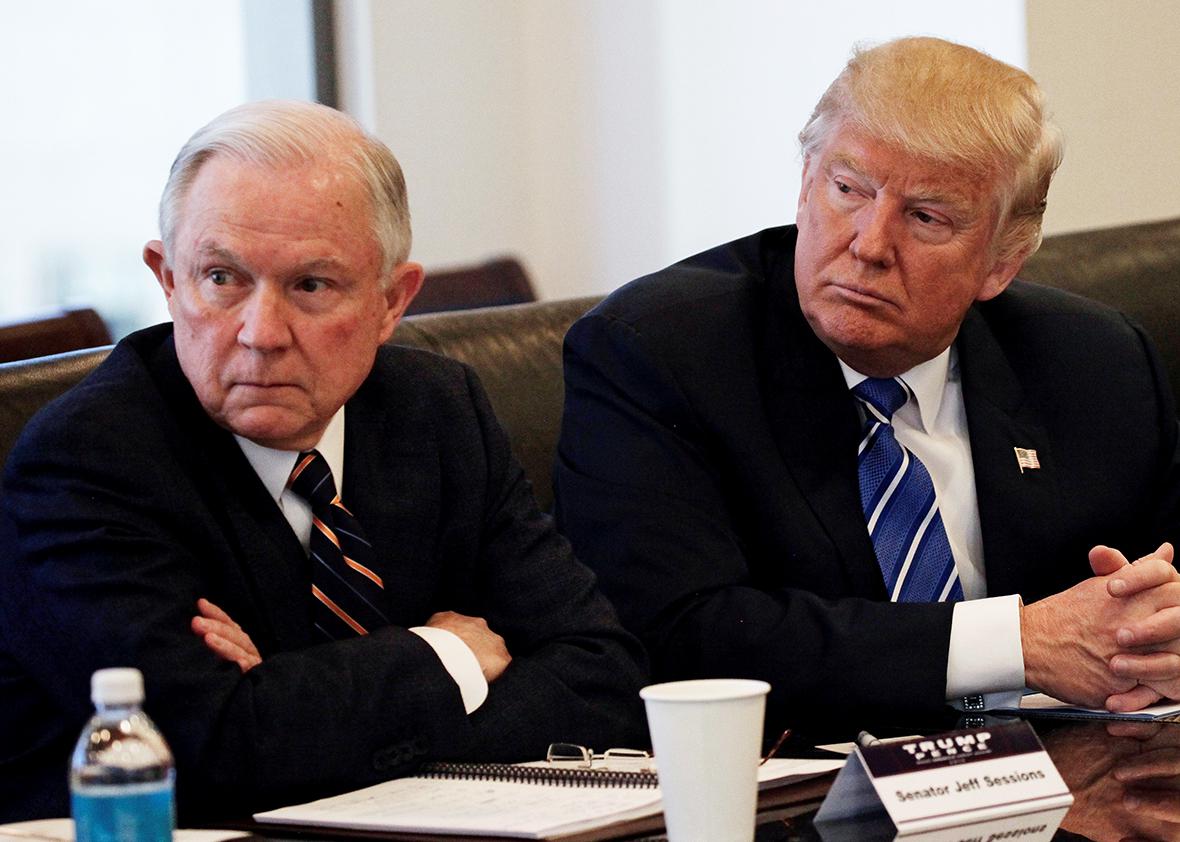You don’t have to look carefully to see the pattern in President-elect Donald Trump’s picks for his Cabinet. To run the government, he has picked men and women who disdain the missions of their assigned agencies, oppose public goods, or conflate their own interests with that of the public. It’s less a team for governing the country than a mechanism for dismantling its key institutions. And as a cadre of tycoons, billionaires, and generals, Trump’s executive branch is a rebuke to the idea that government needs expertise in governing.
For Treasury, Trump has Steven Mnuchin, an investment banker who made billions off of the housing crisis. For the Department of Labor, he has Andrew Puzder, a fast-food CEO who disdains the minimum wage and backs increased automation in low-wage fields. Robots “never take a vacation, they never show up late, there’s never a slip-and-fall, or an age, sex, or race discrimination case,” he once said. For the Department of Education, he has Betsy DeVos, a billionaire “school choice” supporter who gives millions to vouchers and evangelizes charter schools and private instruction. For the Department of Energy, he has former Texas Gov. Rick Perry, who infamously wants to dismantle the agency—when he can remember its name. For Health and Human Services, he has Georgia Rep. Tom Price, who opposes the Affordable Care Act and wants deep cuts in Medicare and Medicaid.
For the Environmental Protection Agency, he has Scott Pruitt, who describes himself as a “leading advocate” against the agency; and for the Department of Justice, he has Alabama Sen. Jeff Sessions, who opposes the Voting Rights Act and supports a rollback of federal protection for LGBT victims of hate crimes. For the Department of State, he has Rex Tillerson, CEO of Exxon Mobil, whose interests and wealth are tangled in a web of global relationships, including a close partnership with Russian President Vladimir Putin.
It’s the antimatter Cabinet—an ungovernment brought forth by reactionary hostility to the idea of the public, a throwback to the industrial oligarchy that eventually brought American democracy to its knees. And on a superficial level, set against the rhetoric of Trump’s campaign, these appointments look like something beyond an expression of hostility to government: They look like a betrayal. This is the populism Trump promised?
Take Tillerson. In a speech he gave to the Asia Society Global Forum in 2013, the energy magnate praised the Trans-Pacific Partnership. “We must embrace the free flow of energy, capital, and human talent across oceans and borders,” he said. This is the same language that Hillary Clinton used in one of her private speeches, and it’s the same language that Trump denounced as a candidate. Indeed, Trump made the TPP a target of his campaign. “The Trans-Pacific Partnership is another disaster done and pushed by special interests who want to rape our country,” he said in a June address. “There is no way to ‘fix’ the TPP,” he continued. “We do not need to enter into another massive international agreement that ties us up and binds us down.”
To nominate Tillerson for secretary of state—after blasting a former secretary of state for backing TPP—is to make a mockery of that rhetoric. But then, the same is true of Trump’s other picks.
Trump railed against Wall Street during his campaign, blasting rival Sen. Ted Cruz and later Hillary Clinton for their ties to Goldman Sachs. But that was when he was a candidate flattering the anger and prejudices of his supporters. Now he’s the next president, and to run his economic team, he’s picked a Goldman Sachs partner (that’s Mnuchin) to run his Treasury Department and the “heir apparent” to the firm, Gary Cohn, to serve as his chief economic policy adviser. Far from “draining the swamp” of malign influence from billionaires and lobbyists, Trump has placed them in even greater positions of power and influence.
It’s tempting to think that Trump will suffer for these choices, that his voters will reject him for embracing the same figures and forces he decried during the campaign. If Trump ran on populism, then this Cabinet—this government—is a slap in the face to those voters who see Trump as a friend to their concerns, who believe they’ve been harmed by a government that privileges the wealthy over ordinary Americans.
But Trump won’t suffer, and here’s why. When Trump railed against “elites,” he wasn’t decrying the rich and powerful. His appeal was built on the fact of his wealth and power, on his promise to bring that wealth and power to bear on Washington and deliver benefits to the deserving. For Trump, “elites” are defined by the people with whom they sympathize. And in his narrative, they sympathize with the racial adversaries of his supporters: Hispanic immigrants, Muslim Americans, and black protesters. “Elites,” in Trump’s telling, are leaders who will not strike back against America’s enemies. This isn’t separate from his appeal to jobs and revitalization; it’s the other side of the coin. With echoes of George Wallace and Richard Nixon, Trump tied economic pain to a racialized picture of “elites.” Those elites, with their sympathy for the “other,” are the reason you are hurting; they are the reason America isn’t great. To elect Trump was to reclaim the country from those elites.
Trump won’t suffer for his Cabinet because he’s already “drained the swamp” of his stated enemies. And in the future, if Trump can’t deliver benefits to his supporters, he has an easy recourse: demagoguery. He can find new elites to blame, new groups to scapegoat, new reasons to hound minorities as the real threat to America’s prosperity. Trump rode white populism to the White House, and he will use white populism to keep it.
